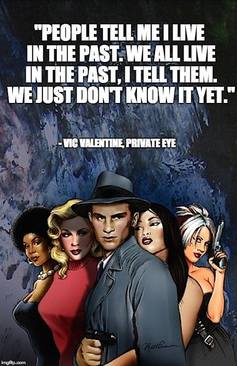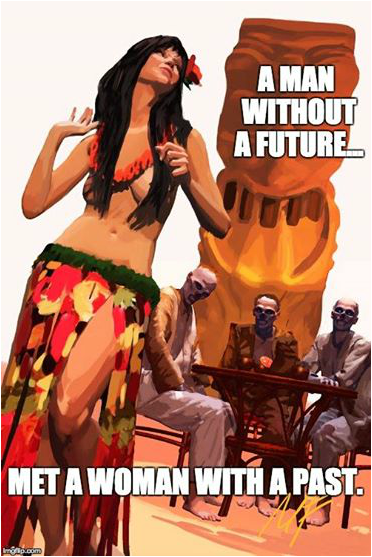Most independent authors do most if not all of their own promotions online. At a certain point, even the most high profile platforms will have exhausted their potential to generate profits, much less interest, in your work, old and new.
So unless you want to pay for boosted posts on Facebook – and while it takes money to make money, the reverse is also true – you will need to get creative. That’s the fun part, for both you and your audience. It’s also shrewdly self-serving. 
I found that posting excerpts from my books on my profile page and my various “fan” pages for each book didn’t invite a lot of “likes” or comments, if any. This is because most people casually browsing Facebook aren’t there to read and absorb long, literary posts. It’s a hit-and-run type of medium. The quicker you can communicate your point, the more likely you’ll get noticed, and appreciated.
However, pictures of anything provocative almost always attract lots of comments (just make sure no forbidden female nipples are showing, which could result in the temporary or permanent shutdown of your account). So once I found out I could create my own memes without the benefit of PhotoShop technology or knowledge, I decided to start embedding short quotes onto artwork from my book covers, which I commissioned and now own all rights to. (Make sure to always pay your artists, editors and subcontractors, both for the sake of your reputation in the community, and so you’ll have the freedom to freely and fully exploit their maximum marketing value). The response from my community was instantly far more positive and pervasive than when I just posted isolated excerpts, even with the book cover, because a meme is meant to inspire an immediate reaction without too much thought investment. The wittier the better, too. Meme Is Money The most popular self-generating meme creator is imgflip.com. It’s very user-friendly, and it’s free. But you need to follow a few general guidelines. For one, when you upload your selected image, make sure you have the rights to publicly share it. Now, this can be a grey area, because many older images are in the public domain. I use a lot of 1950s era commercial art and pinups for my memes, but just to be safe, I reserve those for my own social media networks, where a “fair use rule” is in effect, by and large. But if I wanted to make a meme for a commercial site - like this one, for instance - I’d either have to secure permission from the rights holder, and credit them, or just use my own image. The memes-generator website will offer you the choice of adding memes that can be publicly shared by fellow users, as opposed to a “private” one-off download that only you get to share, when and how you see fit. If you choose the former, the meme will be posted onto your account with a number of social media share links, making it easier for others to find and repost it. This option can potentially provide your meme much more exposure, since total strangers outside your limited social network might share it. But you will have to conform to standard trademark rules. If you just want to create your own meme to share exclusively via your own platforms (thought once they’re posted, anyone can grab and share ‘em anyway), meaning you’re running your own risks, you can use any image you wish. But be careful not to step on any toes, especially if it’s trademarked artwork or photography. Celebrities seem to be fair game, as evidenced by all the political memes currently flooding our newsfeeds. It’s probably best to stick to images you know won’t ruffle any feathers, rights-wise. The More, the Merrier? When it comes to post-frequency, that issue seems to be an open question that can only be addressed individually. If you post “too many” memes, or too much of anything, within too short a period – likewise tweets – some people may unfriend, unfollow, or block you. My response to that is, so what? My Facebook friends list is almost at capacity anyway. This could be a quick, painless way to weed out those that are easily “offended” by too much self-promotion. Anyone that is bothered by me posting frequently about my work is not someone I need to associate with anyway, since they probably won’t wind up buying any books. So what’s the point of our “friendship” (assuming we don't know each other personally)? They’re basically expendable from my point of view, from a professional viewpoint.
As for myself, I never unfriend or unfollow or block anyone for posting “too often” about anything, even if they’re annoying political rants that offend my own moral sensibilities. As far as I’m concerned, what others post on their own pages is their business, even if it’s in full public view. And they have a right to express opposing views, as well as promote their own work, on their own platforms. It’s like seeing a cross or flag on someone’s lawn (as long as neither are being set on fire...). Not my property, and I can always look away. I respect their freedom of expression (as long as no laws are being broken and no one is getting hurt), and I only ask for the same in return.
It all depends on the agenda you set for your own platform. Mine is to promote my pulp fiction and brand name. The rest is social gravy. Rules of Engagement Keep this all in mind when creating your memes, especially if they’re meant to represent you as an author, as opposed to just a "regular person." You also don’t want them to come off too obviously or obnoxiously as “ads.” Keep them light, friendly, funny, even silly, something that anyone could appreciate, not just potential readers. That’s where the building of your “brand name” comes in. You want to establish a public profile that is broadly entertaining and accessible, not just self-indulgent and self-obsessed. But if you’re worried about alienating anyone with too many toots from your own horn, limit your posts to one per hour, or day, or less. I often “blitz” my network in fits of creative energy, but that’s just me. I’m just careful not to burn any bridges I may actually want to cross someday. Also keep in mind that most of your posts will only be seen by a tiny fraction of your overall audience on Facebook. If you’re posting on your own fan or community page, you will notice that it is only “seen” by very few people. This is a purposeful way for Facebook to get you pay to boost the post. I get around this by just reposting on various pages I administrate, and I set my profile to public view. This also invites trolls and the “prude patrol,” but there’s always a tradeoff in any strategy. Bottom line: Spread it, don’t spam it. PHOTOS: WILL VIHARO |
Categories
All
Archives
November 2023
|
|
Locations:
New Orleans, LA Nashville, TN |
|
Digital Media Ghost @2020
|



 RSS Feed
RSS Feed
